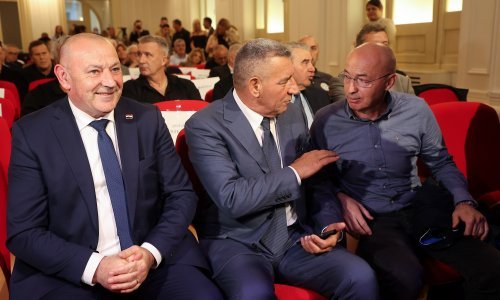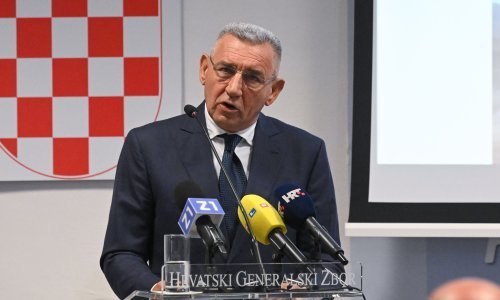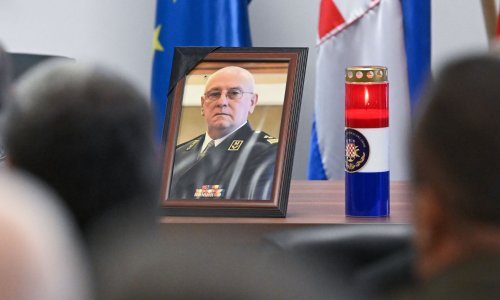Presenting their closing arguments before the International Criminal Tribunal for the former Yugoslavia (ICTY) in August 2010, the defence teams for Generals Ante Gotovina, Ivan Cermak and Mladen Markac requested the Hague-based UN tribunal's trial chamber to acquit their clients adding that the prosecution did not prove the indictees' responsibility for the persecution of the Serb population in Croatia.
Lawyer Luka Misetic, who represents General Gotovina, told the trial chamber that instead of providing the tribunal with evidence, the prosecutors offered different conspiracy theories ranging from the joint criminal enterprise to the persecution of local Serb by indiscriminate shelling, and that the truth was on the side of his client.
Gotovina's defence said that if the allegations by the prosecution had been true, Gotovina would be responsible for the biggest conspiracy of the century, for a criminal policy intertwined with Croatian government policies that left no trace.
Lawyer Misetic said that 11 years after the Croatian army and police operation Storm ICTY prosecutors saw ethnic cleansing caused by indiscriminate shelling, which nobody else could see.
No Serb civilian has told the media or humanitarian organisations that they fled because of the shelling, Misetic said, citing the example of Sarajevo, where he said civilians described their departure as having been caused by the shelling of the city.
Croatian Serb leader Mile Martic cited as the reason for the evacuation of Serb civilians the danger of being encircled, not the shelling, and General Mile Mrksic said the purpose of the evacuation was to prevent civilians from being encircled. He didn't notice ethnic cleansing either, said Misetic.
In his testimony, General Mrksic said that he believed the shells were laser-guided, UN officials too did not establish in their investigations that the area liberated in Operation Storm was ethnically cleansed by shelling, and neither did the then US Ambassador Peter Galbraith, the attorney said.
In a report to the UN Security Council in late August 1995, the UN Secretary-General did not mention ethnic cleansing by shelling, he added.
The defence team said that the prosecutors ascribed to Gotovina powers and responsibilities which he did not have and that all what Gotovina had done to prevent crimes was treated by the prosecutors as fake.
Gotovina's lawyer Payam Akhavan said that the general was responsible for 30,000 soldiers, two fronts in Croatia and Bosnia and Herzegovina, and he did his best to maintain professionalism in his forces.
The crimes that happened do not lead to the conclusion that there was a policy of persecution or that there was a policy of not doing anything which the prosecution alleges was a part of the joint criminal enterprise, the existence of which is based solely on the transcripts from the meeting on the Brijuni islands of July 31, 1995, at which the launching of Operation Storm was agreed, the lawyer said.
Convicting Gotovina for shelling on the basis of the presented evidence would make it possible to accuse any other commander for the normal use of the artillery, he said.
General Gotovina has unjustly spent five years in prison, said his lawyer Akhavan in the closing statement describing Gotovina as a brave and honorable soldier.
The world and the tribunal owe him gratitude for the victory over those who carried out ethnic cleansing and genocide, said Akhavan.
Gotovina's lawyer Gregory Kehoe said that Gotovina was a soldier and a patriot who, together with his units, had worked honorably under difficult conditions on establishing a democratic order in his country.
General Ivan Cermak's defence lawyer Steven Kay said in his closing arguments that the defence provided evidence proving that Cermak's only job was to ensure the normalisation of life in Knin and that the former commander of the Knin Garrison had not powers which the prosecutors alleged that he was assigned.
Cermak was appointed to ensure the normalisation of life in Knin and to help international representatives in the city, lawyer Steven Kay said in his closing argument before the Hague tribunal last August, adding that this was a short-term stint that was not part of the existing military hierarchy.
He was not responsible for the army or the police, Kay said.
As for the prosecution's allegations that he tolerated an atmosphere of impunity and that he allowed crimes, they imply the question what Cermak was actually doing at the time, Kay said, answering that Cermak had both publicly and privately condemned the crimes committed.
Is that how a member of a joint criminal enterprise behaves?, the lawyer asked.
He is a person who was in the wrong place at the wrong time and did not do anything wrong, Kay said.
The lawyer added that Cermak's defence counsel discovered that witnesses for the prosecution had modified the description of Cermak's role in the 1995 Croatian army and police operation Storm.
During the course of the trial defence counsel for Croatian general Mladen Markac presented evidence attempting to prove that special police units had not taken part in war crimes and that Markac made no omissions and that at all meetings he underlined the need to respect international law of war, notably with regard to Serb civilians found by special police forces in villages in the liberated territory.
The prosecution failed to prove the connection between the crimes and the commander's omissions, defence lawyer Tomislav Kuzmanovic said.
The prosecutors claim that Markac took part in covering up the crimes in Grubori, but the evidence shows that Markac received only reports of armed fighting in Grubori, said the lawyer.
Markac did not fail to take the necessary measure to prosecute the perpetrators of the crimes in Grubori, as the evidence had shown that such measures were within the remit of the crime police, not the special police forces, the defence lawyer said in his closing argument last August.
Markac's defence counsel said in their closing argument at the Hague war crimes tribunal that in their final submission to the trial chamber the prosecutors suggested for the first time, without giving any evidence, that Markac ordered the expulsion of local Serbs, as well as killings in the village of Grubori, that he knew that forces under his command were committing crimes against Serb civilians, and that he witnessed the commission of the crimes.
Another defence attorney, Goran Mikulicic, said Markac was an honorable man who spent the best years of his life defending his country and its democracy.
He also urged the trial chamber not to apply the doctrine of joint criminal enterprise which he said was reminiscent of the former Yugoslav concept of prosecution of acts undermining the Socialist order and the mediaeval legal practices.
That doctrine is not based on international humanitarian law and makes it possible to convict a person for a crime committed by another person, with the first person not knowing that the crime has been committed, Mikulicic said.
The attorney also said that it was morally and legally questionable to list dead persons as participants in the joint criminal enterprise, recalling that this was done in the case of former Croatian President Franjo Tudjman and his closest associates Gojko Susak, Zvonimir Cervenko and Janko Bobetko.
The same was done in the case of some living persons, including Ivan Jarnjak, Mirko Norac, Miljenko Crnjac, Rahim Ademi, Jure Radic, Mato Lausic and Josko Moric, who testified before the tribunal as witnesses and were also denied the right to respond to allegations and labelled accomplices in the criminal enterprise, said Mikulicic.


































